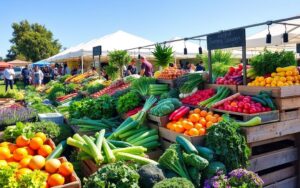Eating locally-sourced food delights the taste buds and boosts sustainability. By opting for local items, you cut your carbon footprint. This happens because local food travels less, leading to fewer emissions.
Supporting local farmers strengthens community ties and guarantees fresher food. Plus, local fruits and veggies often pack more nutrients than those shipped from afar. Embracing local food makes our planet and our communities healthier with every bite.

Understanding Locally-Sourced Food
Locally-sourced food is found within 100 miles of where you live. It’s all about fresh, seasonal, and minimally processed items. This approach helps bring communities closer through what they eat.
Locally-sourced food is key for sustainable farming. It offers farm fresh food that’s full of flavor and nutrients. Plus, it supports organic produce, thanks to many local farms practicing eco-friendly farming. This keeps our environment healthy and diverse.
- Farmers’ markets let you meet the people who grow your food.
- Community Supported Agriculture (CSA) programs offer a share of the season’s harvest. This gives you access to organic produce and connects you with local farmers.
- Local farms provide farm-to-table dinners, featuring foods based on what’s in season.
Benefits of Locally-Sourced Food:
| Aspect | Benefits |
|---|---|
| Freshness | Higher quality and taste thanks to shorter travel times. |
| Nutrition | Foods retain more nutrients when they come straight from the farm. |
| Community Impact | Supporting local farmers boosts the local economy. |
| Environmental Sustainability | Shipping food short distances lowers the carbon footprint. |
Locally-sourced food improves the food we eat and strengthens communities. It supports our environment, making our food system more sustainable and health-oriented.
The Role of Sustainable Agriculture in Local Food Systems
Sustainable agriculture is key for better local food systems. It focuses on eco-friendly practices that help the environment, economy, and society. Methods like organic farming and rotating crops are important. They help create healthy soil and reduce pollution.
Regenerative practices play a big role in sustainable farming. They aim to fix soil health and increase biodiversity. By doing so, farms can grow more wholesome, local food. These practices also balance ecosystems. This makes farms better at fighting pests and diseases.
Farmers who use sustainable ways often see more crops and make more money. Selling locally means fresher, higher-quality food for shoppers. This also builds a strong bond between farmers and the community. It shows why supporting local farmers is crucial for everyone.
| Method | Description | Benefits |
|---|---|---|
| Organic Farming | Utilizes natural processes and materials for crop production. | Enhances soil fertility and reduces chemical runoff. |
| Crop Rotation | Involves alternating crops in a specific sequence. | Prevents pest buildup and maintains nutrient balance. |
| Regenerative Practices | Focus on restoring ecosystems through sustainable methods. | Improves biodiversity and soil health, leading to higher yields. |
These methods all help make local food systems strong. Sustainable agriculture benefits farmers, customers, and our planet.
Environmental Benefits of Eating Locally-Sourced Food
Choosing local food helps the environment greatly. One big plus is it lowers the carbon footprint that comes from moving food long ways. Food from local sources travels less distance to get to your plate. This means it causes less pollution and uses less energy.
Buying food locally supports keeping green spaces alive. Local farms keep the natural scenery and homes for wildlife safe. Also, they tend to use fewer harsh chemicals. This cuts down on harmful runoff from farming.
Local food is good for city environments too. It helps make the soil healthier and richer in life. By eating local food, we help farms that care about the earth. This strengthens the bond between people and nature. It makes more folks aware of the need for sustainable food habits.
| Benefit | Description |
|---|---|
| Reduced Carbon Footprint | Minimized emissions from food transportation. |
| Preservation of Green Spaces | Supporting local farms helps maintain natural habitats. |
| Improved Soil Health | Local farming practices enhance biodiversity and soil quality. |
| Promotion of Sustainable Practices | Encouragement of eco-friendly food production methods. |
Health Advantages of Choosing Farm-to-Table Options
The farm-to-table trend is all about eating fresh food. Such food offers many health benefits. It’s sourced straight from local farms, making it organic and barely processed. So, the food keeps more nutrients compared to food that’s mass-produced.
Eating farm-to-table can mean a healthier life. Research shows it can lead to less obesity and fewer chronic diseases. This is because organic produce is both tasty and nutritious. Fresh food fills you up with important vitamins and minerals.

- Enhanced Nutrient Retention: Food from local farms is packed with more nutrients as it gets to you faster.
- Improved Flavor: Fresh food just tastes better, which can lead to eating healthier.
- Reduced Chemical Exposure: Organic food has less pesticides and toxins.
- Support for Local Farmers: Buying local helps the community and local farmers stay healthy.
| Benefit | Description |
|---|---|
| Nutrient Density | Local produce is often richer in vitamins and minerals. |
| Taste Quality | Better flavor from fresh food makes healthy eating enticing. |
| Healthier Choices | Those who eat fresh tend to eat more fruits and veggies. |
| Environmental Impact | Going organic and local lowers the carbon footprint from transport. |
Choosing farm-to-table dining improves health and helps the planet. It also backs sustainable farming methods.
Supporting Local Economies Through Community-Supported Agriculture
Community Supported Agriculture (CSA) boosts local economies greatly. It links farmers directly with consumers. People can buy shares of local farms.
This approach strengthens the economic base of farm communities. It leads to more jobs and economic stability.
The farm-to-table movement gains a lot from CSA. It eliminates middlemen. This lets farmers get fair prices and stimulates local economies. Consumers support their local businesses.
This engagement boosts local spending. It increases the economic benefits for the community.
Studies show that CSAs lead to higher local economic activity. Direct sales mean more money stays local. This helps not just farms but also markets and restaurants that use local produce.
The positive effects spread. They bring communities closer and encourage local businesses to work together.
| Economic Impact Factors | Without CSA Support | With CSA Support |
|---|---|---|
| Direct Farmer Sales | Less stable income for farmers | Stable income with upfront investments |
| Community Engagement | Limited consumer-farmer connection | Strong community bonds through shared investments |
| Employment Opportunities | Higher unemployment rates in rural areas | Job creation through increased agricultural activity |
| Local Spending | Funds often leave the community | Funds circulate and stay within the economy |
Ethically Sourced and Eco-Friendly Food Choices
More people now want food that is good for the planet and for society. Foods that are ethically sourced usually support farming that’s good for the earth. They also help the people who grow our food and the environment.
Choosing local foods is also eco-friendly. Local farmers often use practices that protect the earth and its creatures. This helps keep our planet diverse and healthy.
Making smart choices requires knowing where your food comes from. Fair Trade certification is one way to be sure farmers are treated well. People prefer buying from sources they can trust. This trust is strengthened when they know the origin of their food.
Below is a table outlining key elements of ethically sourced food and their benefits:
| Aspect | Details | Benefits |
|---|---|---|
| Source Transparency | Clear information about where food comes from | Builds trust and promotes responsible choices |
| Sustainable Farming | Practices that protect the environment and local ecosystems | Helps preserve natural resources for future generations |
| Animal Welfare | Ethical treatment and humane conditions for livestock | Ensures health and well-being of animals |
| Community Support | Local sourcing directly supports regional economies | Strengthens community ties and local job markets |
Nowadays, people are more conscious about what they eat. They want to back companies that care about ethics in food production. By choosing these products, we are helping to create a greener future. We also get the health perks of fresh, locally grown foods.
The Social Impact of Eating Locally-Sourced Food
Eating food from local sources greatly boosts community well-being. It helps build strong bonds among people. Through local food, sharing becomes easier. This includes resources, values, and traditions.
Being part of local food efforts helps make the community social fabric strong. It shows care for each other and the place we live. It highlights the importance of working together for the common good.
Local food projects often spark more community action. They help make food more available and celebrate local culture. This brings people together around things like farmers’ markets and community gardens. It makes community bonds stronger and encourages working together.
Also, joining local food movements means eating fresher, healthier food. It supports local families and businesses. This kind of support helps lessen the gap between rich and poor. It also backs up efforts to look after our planet. Eating local is something we all do together, and everyone wins.
| Community Engagement Benefits | Description |
|---|---|
| Enhanced Relationships | Strengthens ties among community members through shared experiences. |
| Food Security | Improves access to fresh produce, reducing reliance on distant food sources. |
| Cultural Revitalization | Celebrates local traditions and flavors, enriching community heritage. |
| Economic Support | Encourages local spending, supporting farmers and food artisans. |
Choosing local food makes our communities stronger and improves life for everyone. It shows we care deeply about each other and our environment. This choice reflects a commitment to helping each other and making our community a better place.
How to Incorporate Locally-Sourced Food into Your Diet
Adding local food to your daily meals boosts your diet and connects you to your community. Start by visiting farmers’ markets. Here, you can find a range of fresh produce right from the growers. This is perfect for eating with the seasons.
Another great option is to join a Community Supported Agriculture (CSA) program. With a CSA, you get fresh, seasonal produce regularly. This supports local farmers. Planning meals with these ingredients saves money and is better for our planet.
Planning meals based on what’s in season can improve your cooking. It means your meals will be tasty and wallet-friendly. Plus, you get to enjoy and value local produce more.
- Explore local farmers’ markets for fresh ingredients.
- Join a CSA for regular access to seasonal produce.
- Prioritize meal planning to make the most of these ingredients.
- Research seasonal eating guides for ideas.
Embracing these steps gives you better food, helps your community, and protects the environment.
Conclusion
The benefits of locally-sourced food go beyond just filling our stomachs. They play a big part in making choices that are good for the planet, help our communities stay healthy, and lessen the environmental impact of what we eat. When we choose to buy food grown near us, we help local farmers and the economy. This builds a community that supports each other.
Choosing local food matters a lot. It makes us part of a movement for better sustainability. Buying from local markets makes our food fresher and more nutritious. It also helps protect the environment and strengthens our communities. By preferring food from nearby, we help shape the future of eating in our areas.
We should get involved with local agriculture and push for policies that support local food. Learning about where our food comes from is also important. If we all do these things, we can make our communities healthier and our planet better. Moving towards local food is a key step for a sustainable future.
FAQ
What is the significance of locally-sourced food?
Locally-sourced food supports sustainable farming. It cuts down on transport emissions. This helps local economies and offers health benefits from fresh, organic food.
How can I find community-supported agriculture (CSA) programs?
You can find CSA programs by looking online for local farms. These farms may have websites or social media with sign-up info. Farmers’ markets are also a good place to find local CSAs.
What are the environmental benefits of eating farm-to-table food?
Farm-to-table food reduces your carbon footprint by minimizing food travel. It supports eco-friendly farming, keeps local ecosystems healthy, and preserves green spaces.
Why should I choose organic produce over conventionally grown options?
Organic produce is grown without harmful chemicals. This benefits your health and the planet. Organic farming improves soil health and biodiversity.
How does eating locally impact the economy?
Eating locally helps local economies by supporting farmers and food producers. It creates jobs in agriculture. This strengthens community networks and encourages farm-to-table movements for economic stability.
What are some practical ways to incorporate locally-grown food into my diet?
Start by shopping at farmers’ markets or joining a CSA. Look for local restaurants that use sustainable ingredients. Seasonal meal planning lets you enjoy regional food all year.
What should I consider when sourcing ethically sourced food?
Look into the practices of local farmers and how they source their food. Support those who farm sustainably, care for animals well, and follow fair trade. This boosts eco-friendly choices.
How does eating locally-sourced food affect social responsibility?
Eating local food strengthens our communities. It promotes social responsibility through support and cooperation. Local food networks encourage community engagement and well-being.
What impact does sustainable agriculture have on food security?
Sustainable agriculture makes food systems more resilient. It helps communities avoid global market issues. By backing local producers, we get accessible, nutritious food and protect the environment.
Can locally-sourced food contribute to better health outcomes?
Yes. Locally-sourced food ensures freshness and high nutrient content. Foods picked at peak ripeness offer more vitamins and minerals, reducing health risks like obesity and chronic illnesses.




